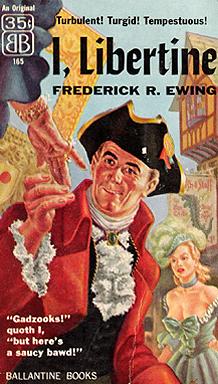
Irritated at the way bestseller lists were compiled in the 1950s, late-night radio host Jean Shepherd asked his listeners to visit bookstores and request a nonexistent book, I, Libertine, by the imaginary author Frederick R. Ewing.
The number of requests drove the title onto the New York Times bestseller list, and, encouraged by its popularity, bookstores began to order the novel. So Shepherd and publisher Ian Ballantine got novelist Theodore Sturgeon to write it, following the plot that Shepherd had described to his listeners. (Sturgeon fell asleep while trying to write the whole book in one marathon session, so Ballantine’s wife Betty had to write the last chapter.)
Ballantine Books published the novel in September 1956, using a photo of Shepherd in place of Ewing, and donated the proceeds to charity.
The Wall Street Journal exposed the hoax a few weeks before publication. “Mr. Ballantine’s idea, though simple enough, was a startling one, for publishers consider it one of the greatest possible tragedies to print a book later discovered to be the work of a literary faker,” wrote reporter Carter Henderson. “At Simon & Schuster, Inc., faces still redden when Joan Lowell’s autobiographical ‘Cradle of the Deep’ is mentioned even though this phony tale of a young girl’s spectacularly adventurous life at sea was published in 1929.”




